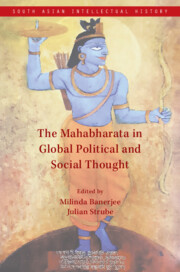The Mahabharata in Global Political and Social Thought
The ancient Indian epic, Mahabharata, was first composed in Sanskrit and then rendered into Indian vernaculars and other Asian and European languages. This book demonstrates how the epic has shaped the birth of modern politics and thought across India, Europe, Japan, China, Thailand, Iran, and the Arab world. It draws on methodologies of global intellectual and religious history. The contributing authors are specialists on various world-regions. They reveal how kings and peasants, statesmen and revolutionaries, intellectuals, and activists, have invoked the epic to forge their political visions over the past centuries. The epic has thus contributed to state formation, nationalism, as well as the decolonization and democratization of the modern world. This book helps us understand the non-Eurocentric roots of modern political and social ideas, in India and across Asia and Europe. We thereby understand the global origins of contemporary politics, society, and democracy.
- Uses lucid and accessible language to appeal to wider readership
- Helps us understand the non-Eurocentric roots of modern politics and political, social, and religious thought, in India and across Asia and Europe
- Contributes to the efforts of decolonizing and democratizing the modern world
Product details
March 2025Hardback
9781009484688
300 pages
235 × 161 × 26 mm
0.59kg
Available
Table of Contents
- Acknowledgements
- A Note on Transliteration
- Introduction Milinda Banerjee and Julian Strube
- 1. The Mahabharata and the Making of Modern India Milinda Banerjee
- 2. 'Epic' Past, 'Modern' Present: The Mahabharata and Modern Nationalism in Colonial Western India Alok Oak
- 3. The Bhagavadgita and the Gandhian Hermeneutic of Non-Violence: Globalizing Selfless Action Arkamitra Ghatak
- 4. A Nostalgia for Transcendental Closure: The Relationship between the Mahabharata and Notions of Nationalism in the Works of Friedrich Schlegel, Maithilisharan Gupt, and Jawaharlal Nehru Philipp Spernervi
- 5. The Production and Deconstruction of the 'Ideal Indian Woman' on the Basis of the Mahabharata in the Twentieth and Twenty-First Centuries Melanie J. Müller
- 6. Rethinking Transnational Intellectual History and Epic Nationalisms through Lithographic Labour: Persian and Urdu Mahabharatas in India and Iran Amanda Lanzillo
- 7. 'Philosophical Poetry' or a 'Failed Beginning'? A Metaphilosophical Enquiry into Wilhelm von Humboldt's and G. W. F. Hegel's Perspectives on the Bhagavadgita Paulus Kaufmann
- 8. East Asian Uses of Indian Epic Literature: Refractions of the Mahabharata in Japan and China, Late Nineteenth–Early Twentieth Century Egas Moniz Bandeira
- 9. The Reception of the Mahabharata in Siam: Evolving Conceptions of Kingship David M. Malitz
- 10. Understanding Global Intellectual Exchanges through Paratexts: Wadiʿ al-Bustani's Introduction to His Arabic Translation of the Mahabharata Christopher D. Bahl and Abdallah Soufan
- About the Contributors
- Index.






